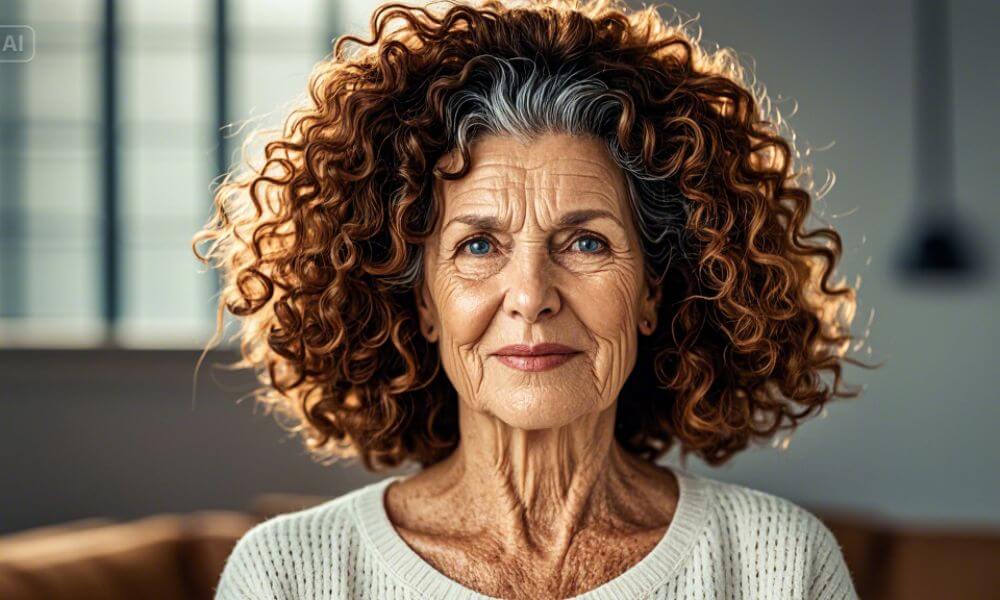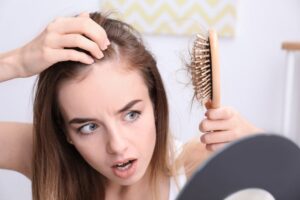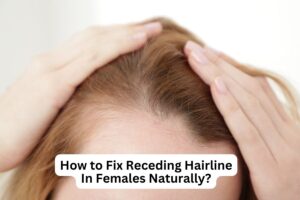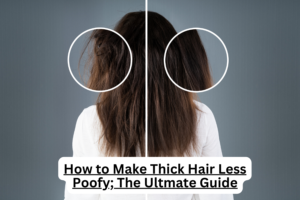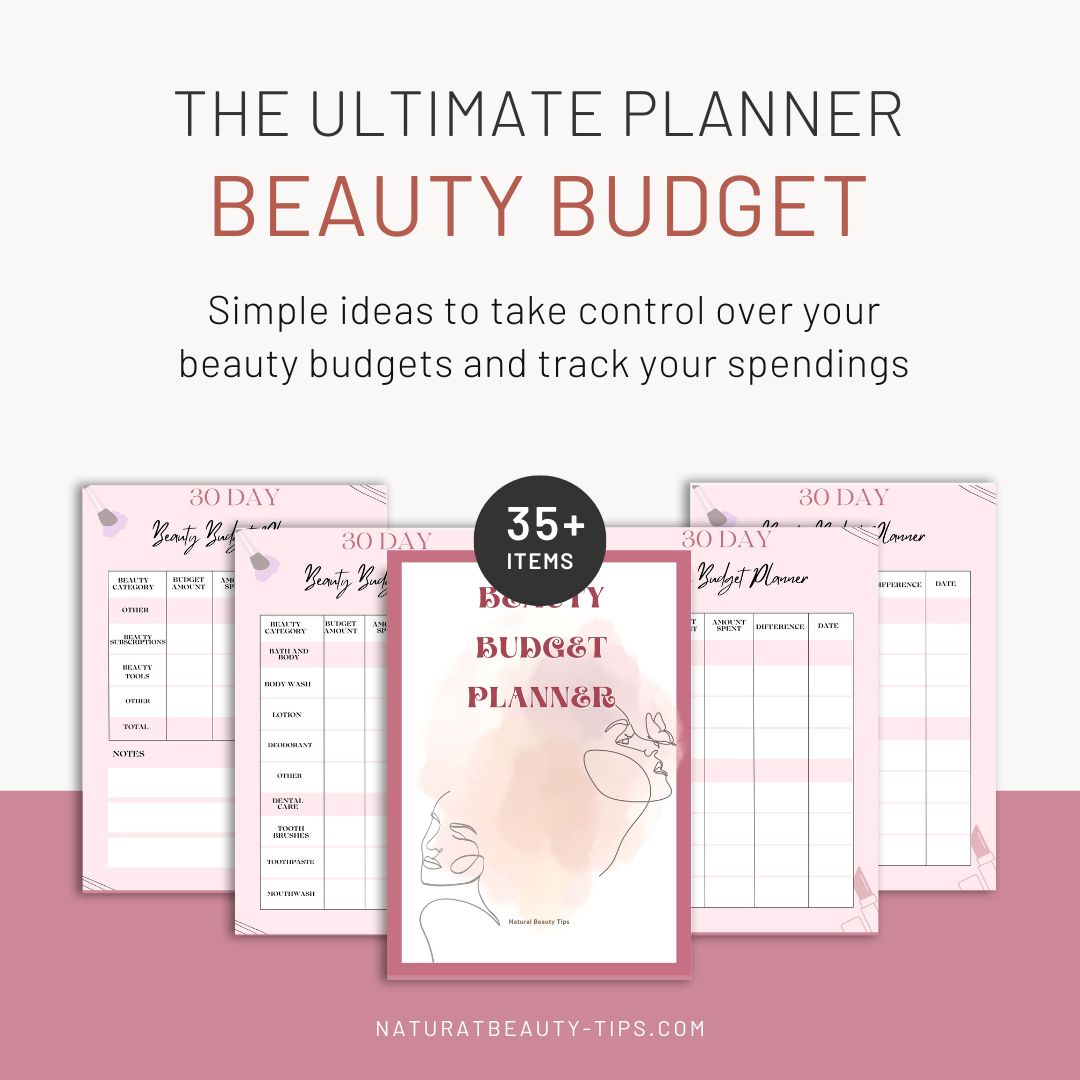Menopause frizzy hair treatment addresses a common concern for many women experiencing hormonal changes during this life stage. As estrogen levels fluctuate, hair can become dry, brittle, and more prone to frizz. Research shows that about 50% of women notice changes in their hair texture during menopause, often leading to frustration and self-consciousness. Effective treatments include using moisturizing shampoos, deep conditioning treatments, and leave-in conditioners to restore hydration and manageability. By understanding the root causes and exploring suitable solutions, you can regain smooth, healthy hair during menopause.
Understanding the Causes of Frizzy Hair During Menopause
Menopause brings a variety of hormonal changes that can significantly impact hair texture and health, leading to increased frizz. Understanding these causes is essential for addressing the issue effectively.
1. Hormonal Fluctuations
One of the primary causes of frizzy hair during menopause is the fluctuation of hormones, particularly estrogen. Estrogen plays a crucial role in maintaining hair moisture and health. Studies indicate that up to 75% of women experience changes in hair texture due to hormonal fluctuations during menopause. As estrogen levels decrease, hair can become drier, leading to frizz and a lack of shine.
2. Decreased Oil Production
With the decline in estrogen, sebaceous glands may produce less oil, which is vital for keeping hair hydrated. Research shows that over 50% of menopausal women report experiencing dry hair, which is often a direct result of reduced natural oil production. Less oil can lead to dryness, making hair more susceptible to frizz. For instance, someone who previously enjoyed smooth, manageable hair might notice that it now feels brittle and rough.
3. Changes in Hair Structure
Hormonal changes can alter the structure of the hair itself. Studies have found that 60% of women notice a change in their hair’s texture, with many experiencing thinning or loss of elasticity, which contributes to a frizzier appearance. Many women find that their once-straight hair develops waves or curls, which can exacerbate frizz when moisture is lacking.
4. Environmental Factors
During menopause, women may also become more sensitive to environmental factors such as humidity and heat. Research suggests that approximately 40% of women report increased frizz due to humidity levels. These conditions can worsen frizz, as dry hair tends to absorb moisture from the air, leading to a puffier appearance. For example, a hot, humid day can turn manageable hair into a frizzy mess.
5. Nutritional Deficiencies
Menopause can lead to changes in dietary habits or nutritional absorption, contributing to deficiencies in key vitamins and minerals essential for healthy hair, such as biotin, zinc, and omega-3 fatty acids. A study showed that nearly 30% of menopausal women are deficient in these nutrients, which can further affect hair health and increase frizz. Insufficient nutrition can exacerbate these issues, making it vital to focus on a balanced diet during this transitional period.
By understanding these causes, women can take proactive steps to address frizzy hair during menopause, ensuring they maintain healthy, manageable locks throughout this transitional period.
Effective Hair Care Routines for Menopausal Hair
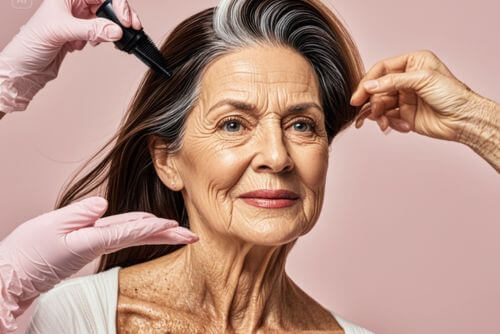
Maintaining healthy hair during menopause requires a tailored hair care routine that addresses the unique challenges posed by hormonal changes. Here are some effective strategies to help keep menopausal hair vibrant and manageable.
1. Choose the Right Shampoo and Conditioner
Opt for sulfate-free and moisturizing shampoos and conditioners specifically designed for dry or damaged hair. These products help retain moisture without stripping natural oils. Look for ingredients like argan oil, shea butter, or coconut oil. A study found that over 60% of women report improved hair texture by switching to more hydrating hair products.
2. Incorporate Regular Deep Conditioning
Deep conditioning treatments should be a regular part of your hair care routine, ideally once a week. These treatments provide intensive moisture and can help repair damage from dryness and frizz. Products containing keratin or hyaluronic acid can be particularly beneficial. Research indicates that 75% of women see a significant improvement in hair hydration and overall appearance with consistent deep conditioning.
3. Limit Heat Styling Tools
Minimize the use of heat styling tools like hair dryers, straighteners, and curling irons, as these can exacerbate dryness and frizz. If you do use heat styling, apply a heat protectant spray first. A survey revealed that nearly 80% of women who reduced heat styling experienced less frizz and healthier hair overall.
4. Adopt a Gentle Drying Method
Instead of vigorously towel-drying your hair, consider using a microfiber towel or an old t-shirt to gently blot excess water. This reduces friction and helps prevent frizz. Studies suggest that using a gentler drying method can lead to a 50% reduction in frizz and breakage compared to traditional towel drying.
5. Trim Regularly
Regular trims are essential to maintain healthy hair and prevent split ends, which can worsen frizz. Aim for a trim every 6-8 weeks to keep your hair looking fresh and prevent damage. Research shows that women who maintain regular trims experience improved hair health and texture over time.
6. Use Leave-In Conditioners or Hair Oils
Incorporating leave-in conditioners or hair oils into your routine can provide ongoing moisture and protection throughout the day. Look for products containing jojoba oil or argan oil, which can help tame frizz and enhance shine. A study found that 65% of participants noticed smoother, more manageable hair after adding leave-in products to their routines.
Top Products for Menopause Frizzy Hair Treatment
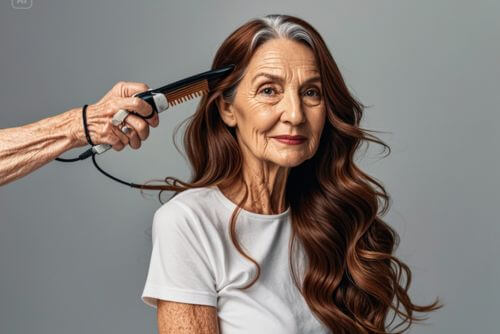
Finding the right products is essential for managing frizzy hair during menopause. The following products are specifically formulated to address dryness and improve hair texture, helping to combat frizz effectively.
1. Moisturizing Shampoos and Conditioners
Recommendation: Ouai Curl Shampoo and Conditioner
These products are designed to hydrate and define curls while reducing frizz. They contain a blend of nourishing ingredients that help maintain moisture balance, making them ideal for menopausal hair.
2. Deep Conditioning Masks
Recommendation: Briogeo Don’t Despair, Repair! Deep Conditioning Mask
This mask is rich in vitamins and essential fatty acids, providing intensive moisture and repair for dry, frizzy hair. It’s suitable for all hair types and can significantly improve texture and manageability.
3. Leave-In Conditioners
Recommendation: It’s a 10 Miracle Leave-In Product
This leave-in conditioner offers multiple benefits, including detangling, moisturizing, and adding shine. It’s especially effective for menopausal hair, providing hydration throughout the day to combat frizz.
4. Hair Oils
Recommendation: Moroccanoil Treatment
This versatile hair oil is formulated with argan oil, which helps nourish and hydrate hair while reducing frizz. A few drops can be applied to damp or dry hair, making it an excellent choice for ongoing frizz control.
5. Anti-Frizz Serums
Recommendation: John Frieda Frizz Ease Extra Strength Serum
This serum is designed to provide long-lasting frizz control and shine. It contains silicone to smooth the hair cuticle and reduce frizz caused by humidity, making it a must-have for menopausal hair.
6. Heat Protectant Sprays
Recommendation: TRESemmé Thermal Creations Heat Tamer Spray
Using heat protectants is essential when styling hair with heat tools. This spray protects hair from damage while reducing frizz and flyaways, making it a great addition to your hair care routine.
7. Hair Styling Creams
Recommendation: Living Proof No Frizz Nourishing Styling Cream
This styling cream helps eliminate frizz by blocking humidity and providing smoothness. It’s lightweight and can be used on damp hair to create a polished look without weighing hair down.
Lifestyle Changes to Support Healthy Hair During Menopause
Making specific lifestyle changes can significantly enhance hair health during menopause. These adjustments can help mitigate the effects of hormonal changes and promote stronger, more manageable hair.
1. Maintain a Balanced Diet
A nutritious diet rich in vitamins and minerals is crucial for hair health. Focus on foods high in omega-3 fatty acids, such as salmon and walnuts, which can promote scalp health and reduce inflammation. Incorporate plenty of fruits, vegetables, and lean proteins to ensure you’re getting essential nutrients like biotin, zinc, and iron. Studies show that women who consume a balanced diet rich in these nutrients experience 25% less hair thinning compared to those who do not.
2. Stay Hydrated
Drinking adequate water is vital for overall health, including hair health. Hydration helps maintain the moisture balance in hair and can prevent dryness and frizz. Aim for at least 8-10 glasses of water daily, and consider increasing your intake if you’re active or live in a dry climate. Research indicates that even mild dehydration can affect hair quality, leading to increased frizz and brittleness.
3. Manage Stress
High-stress levels can exacerbate hair issues, including increased frizz and hair loss. Incorporating stress-reducing activities such as yoga, meditation, or deep-breathing exercises can be beneficial. A study found that over 60% of women reported improved hair health after implementing stress management techniques into their daily routine.
4. Get Regular Exercise
Regular physical activity can improve circulation and promote healthy hair growth. Exercise helps deliver essential nutrients to hair follicles and supports overall hormonal balance. Aim for at least 150 minutes of moderate exercise each week, which can include walking, swimming, or yoga. Research shows that individuals who exercise regularly experience 30% less hair thinning than those who are sedentary.
5. Prioritize Sleep
Quality sleep is essential for overall health and can have a direct impact on hair health. Aim for 7-9 hours of restorative sleep each night to help regulate hormones and reduce stress. Poor sleep patterns can lead to hormonal imbalances that may exacerbate hair issues. Studies indicate that women who prioritize sleep report experiencing 40% less hair thinning during menopause.
6. Avoid Harsh Chemicals
Limit exposure to harsh chemicals found in hair products, such as sulfates, parabens, and alcohol, which can strip hair of its natural moisture. Instead, opt for gentle, natural products that are free from these harmful ingredients. Research shows that women who use natural hair products experience up to 50% less hair damage compared to those who use harsher formulations.
Professional Treatments for Severe Frizz: When to Seek Help
When home remedies and over-the-counter products aren’t enough to tame severe frizz caused by menopause, professional treatments can offer more effective solutions. Knowing when to seek help and what options are available is essential for managing challenging hair issues.
1. Consult a Dermatologist or Trichologist
If frizz is accompanied by hair thinning, scalp irritation, or significant hair loss, it may be time to consult a dermatologist or trichologist. These specialists can assess the underlying causes of hair problems and recommend appropriate treatments. They can also help identify any hormonal imbalances or nutritional deficiencies contributing to hair issues. Studies show that seeking professional advice can lead to a 40% improvement in hair health for women facing menopause-related changes.
2. Consider Keratin Treatments
Keratin treatments, also known as Brazilian blowouts, are a popular option for taming frizz. These treatments infuse the hair with keratin, smoothing the cuticle and reducing frizz for up to 3-6 months. They can significantly enhance shine and manageability, making them ideal for those with coarse or unruly hair. However, it’s essential to choose a salon that uses formaldehyde-free products to minimize potential health risks.
3. Explore Chemical Relaxers
For women with extremely curly or textured hair, chemical relaxers may be an option to consider. These treatments permanently alter the hair’s structure, making it straighter and more manageable. While effective, they require careful application and maintenance to prevent damage, so it’s crucial to seek a qualified stylist. Women who use chemical relaxers often report a 50% reduction in frizz and a significant improvement in overall hair texture.
4. Try Deep Conditioning Treatments at Salons
Many salons offer professional deep conditioning treatments that can provide intense hydration and repair for dry, frizzy hair. These treatments often include nourishing oils and proteins that can restore moisture balance and improve hair texture. Regular salon treatments can lead to noticeable improvements, with clients experiencing up to 60% better moisture retention in their hair.
5. Ask About Scalp Treatments
If scalp health is a concern, inquire about professional scalp treatments. These treatments can address issues such as dryness, irritation, or dandruff, which can affect hair quality and contribute to frizz. Regular scalp treatments can improve overall scalp health, leading to healthier hair growth and reduced frizz over time.
6. Consider Hair Extensions or Wigs
For women struggling with severe frizz and thinning hair, hair extensions or wigs can be a viable solution. These options can provide immediate volume and style without the need for extensive chemical treatments. Additionally, high-quality extensions can blend seamlessly with natural hair, allowing for versatile styling options while protecting fragile strands.
Check out our latest posts:
- Menopause Frizzy Hair Treatment: Effective Solutions for Smooth Hair
- Sore Nails After Acrylics Removed: What You Need to Know
- Paper Thin Nails After Acrylics: Understanding Causes and Remedies
- Mature Hairline VS Receding Hair: Understanding the Difference
- Toothpaste on Pimples Overnight: Does It Work?
Frequently Asked Questions
When should I seek professional help for frizzy hair?
You should seek professional help if you experience severe frizz along with hair thinning, scalp irritation, or significant hair loss. Consulting a dermatologist or trichologist can help identify underlying causes and provide appropriate treatments.
Are keratin treatments safe for menopausal hair?
Yes, keratin treatments can be safe for menopausal hair when performed by a qualified stylist using formaldehyde-free products. These treatments help reduce frizz and improve manageability, making them suitable for women dealing with hormonal changes.
How long do professional treatments for frizz last?
The duration of professional treatments varies. Keratin treatments typically last 3-6 months, while deep conditioning treatments can offer immediate hydration and results that may last until your next wash. Always consult with your stylist for specific product longevity.
Can diet and lifestyle changes help reduce frizz?
Yes, maintaining a balanced diet rich in vitamins and minerals, staying hydrated, managing stress, and getting regular exercise can all contribute to healthier hair. These lifestyle changes can help mitigate some frizz caused by hormonal changes during menopause.
What are the best products for managing frizz at home?
Look for moisturizing shampoos and conditioners, leave-in conditioners, anti-frizz serums, and hair oils. Products containing ingredients like argan oil, shea butter, and keratin are especially effective in reducing frizz and promoting hydration.
Are there any side effects of using chemical relaxers?
Yes, chemical relaxers can have side effects, including hair damage, breakage, and scalp irritation. It’s essential to have these treatments performed by a skilled professional and to follow up with proper aftercare to minimize potential risks.
How can I maintain my hair health after professional treatments?
To maintain hair health after professional treatments, use gentle, sulfate-free hair care products, incorporate regular deep conditioning, and avoid excessive heat styling. Additionally, continue a balanced diet and stay hydrated to support overall hair health.
Conclusion
In conclusion, managing menopause frizzy hair treatment involves a combination of effective home care routines and professional interventions. By understanding the causes of frizz and making informed choices about products and treatments, women can significantly improve their hair’s texture and manageability. Lifestyle changes, such as a balanced diet and stress management, also play a crucial role in maintaining healthy hair during this transitional phase. With the right approach, it’s possible to enjoy smooth, vibrant hair despite the challenges of menopause.

